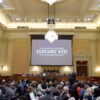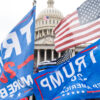Facing rising populist anger over his administration’s billion-dollar bailouts, President Barack Obama proposed a $117 billion tax over the next 12 years on financial companies with assets of more than $50 billion. “We want our money back, and we’re going to get it,” the President said. The President is half right. Taxpayers are going to get their money back from the banks that received bailout money … but don’t expect to see any of the money the Obama administration poured into General Motors and Chrysler at the behest of their union allies. That is where the real losses are coming from.
The TARP program has so far distributed $247 billion to more than 700 banks. Of that, $162 billion in principal and $11 billion in interest and dividends have already been repaid. Except for AIG, almost all banks that received taxpayer money are expected to pay back the American taxpayers in full. As The New York Times reports: “The losses from the bailout fund are expected from money paid to rescue Chrysler and General Motors and the insurance giant American International Group, and from a program to help homeowners avert foreclosures.”
So the real deadbeats that are not giving us “our money back” are not the banks, but the union-backed car companies and failed government mortgage modification programs. But guess what? The White House has chosen not to include the car companies among the institutions that will pay this so called “Financial Crisis Responsibility Fee.” Also exempted are Fannie Mae and Freddie Mac, the government-sponsored entities that helped create the crisis.
The plan also will do nothing to help reform the banking system. Financial regulatory analyst Karen Shaw Petrou tells The Washington Post: “The new big-bank tax is just like charging a nickel sin tax on a half-gallon of cheap liquor — it may make moralists feel good, but it doesn’t do much to stop bad behavior.” Instead of protecting consumers, it will just end up hurting them. Financial services analyst Meredith Whitney tells The New York Times: “The irony is it hurts the weaker banks more than the stronger banks. To think that it won’t come out of consumers and businesses is mistaken.” And banking analyst David Hendler tells Bloomberg: “We remain concerned that this is more evidence of the cynical view of the banking industry which prevails in Washington.”
In sum, this new $117 billion Obama tax will penalize firms that already repaid TARP, and some who never accepted bailout money to begin with, while also making it harder for Americans to get the loans they need to help our economy recover, all while letting the real deadbeats get off scot-free. If the President were serious about making taxpayers whole and restoring confidence in the banking sector, then he should end TARP now.
Quick Hits:
- President Barack Obama reached out to former Presidents George W. Bush and Bill Clinton yesterday, asking them to help lead private sector fundraising efforts for Haiti.
- New unemployment insurance claims unexpectedly rose by 11,000 this week and retail sales also unexpectedly fell in December.
- The White House officially announced they had cut a behind-closed-door deal with unions yesterday, exempting union contracts from a 40% excise tax on health insurance until 2018.
- John Stossel reports on the suspicious success of a “green” windows company that has done surprisingly well in the down economy, but not without some unusual help from President Obama and Vice President Biden.
- In an interview with a Boston radio show, Massachusetts Attorney General Martha Coakley said of people with pro-life views: “You can have religious freedom but you probably shouldn’t work in the emergency room.”


























